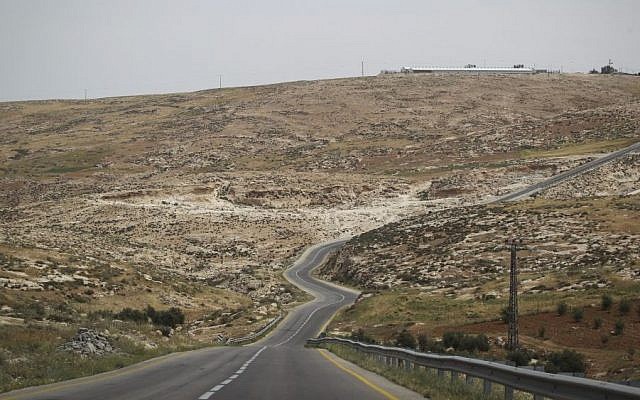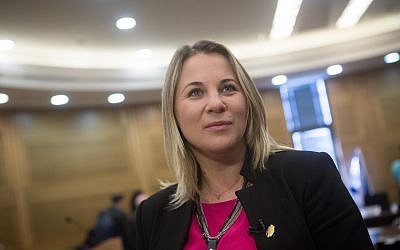Zandberg committee conclusions, which critics say treat the territories like Israel proper, are already being implemented on the ground
With Israeli eyes set on all things Iran and an imminent US embassy move, last week’s publication of a document that provides the state with tools to legalize thousands of wildcat West Bank homes went largely unnoticed.
While the recommendations of the 201-page Zandberg report were celebrated by a number of coalition lawmakers who count Israeli settlers among their most loyal supporters, just one opposition MK released a statement panning the report’s conclusions by the day’s end.
Perhaps there was a feeling of “been there, done that” among parliamentarians and members of the press, who aggressively covered two similar reports on the settlement enterprise upon their respective releases in 2005 and 2012.
The first, the Sasson report, blasted the state’s compliance in unlawful West Bank building by Israelis, deemed such illegal construction to be a criminal offense and, accordingly, called for the demolition of all unauthorized outposts.
Seven years later, Prime Minister Benjamin Netanyahu commissioned an additional review on the matter that came to starkly different conclusions. The Levy report not only postulated that Israeli settlements are kosher under international law, but it recommended that the dozens of unauthorized outposts in the West Bank be legalized rather than razed.
Mirror images of one another, the Sasson and Levy reports were similar in one key way: They both went largely unimplemented.

Yes, a number of outposts have been demolished since the Sasson report and others have been granted full legal status by the state since the Levy report. However, the underlying decisions by the governments that commissioned them was that they be shelved, either because their conclusions were viewed as too extreme or because of a lack of political will to grapple with their implications.
The recommendations of the Zandberg report published last Friday are even more far-reaching than those of the Levy report, as they provide the legal tools to carry out the conclusions reached by former supreme court justice Edmund Levy and his team in 2012.
Stating their guiding principles for the document, the document’s authors list plainly among them their intention to bring about “the legalization of the existing Israeli communities and neighborhoods in Judea and Samaria (the West Bank).”
Accordingly, one would perhaps expect the document put together by Jerusalem District Court Judge Haya Zandberg to be relegated, like its two predecessors, to the top of a cobwebbed bookshelf in the Prime Minister’s Office.
So what?
Justice Minister Ayelet Shaked, who was influential in the commissioning of the report and who has lobbied aggressively for Zandberg’s appointment last year, is convinced that the most recent findings will be implemented.
“In fact, some of them already have been,” she said in a phone conversation with The Times of Israel. Shaked provided two examples of legal precedents from the Zandberg report that has already been adopted by Attorney General Avichai Mandelblit to respond to High Court petitions over the past six months.
The first was regarding the paving of an access road to the central West Bank outpost of Haresha on land belonging to Palestinians.
Arguing in favor of paving the access road, Mandeblit cited an October 2017 ruling from Supreme Court Justice Salim Joubran, who wrote that “the Israeli residents of the area (West Bank)… are also among the civilian population in the area,” and that therefore the ruling body “is obligated to act for their welfare… even by violating the property rights” of the original Palestinian land owners.

Justice Minister Ayelet Shaked arrives at the weekly cabinet meeting at the Prime Minister’s Office in Jerusalem, on Aptil 29, 2018. (Amit Shabi/Flash90)
The Zandberg report recommends that the precedent set by Joubran and utilized by Mandelblit be implemented across the West Bank to legalize outposts that were built on land belonging to the state but without any of the necessary permits.
Shaked went on to point out how the Zandberg report’s recommendation to legalize thousands of unlawfully built settlement homes using “market regulation” was also a policy that had already been adopted by Mandelblit.
In December, Mandelblit used the precedent, which trusts that wildcat Israeli homes were built in good faith by unwitting settlers, to authorize the construction of 91 homes on land in the settlement of Ofra that the Defense Ministry had recently discovered belongs to Palestinians.
An across-the-board adoption of “market regulation” as recommended by the Zandberg report would see the de facto legalization of thousands of homes built on land settlers believed to have belonged to the state only to later be told otherwise by the Defense Ministry.
Ksenia Svetlova, the lone member of the opposition to issue a statement against the report on the day it was published, offered a similar prognosis regarding its implications.

“Because the government was unable to implement the Levy report, they need to be able to show some sort of result on this issue,” the Zionist Union lawmaker said.
“It will give a tailwind to settlers to continue building illegally,” Svetlova argued.
She referred to the report as a “legal carte blanche,” providing another avenue for advancing the so-called “Regulation Law.”
That more sweeping law allows the Israeli government to expropriate private Palestinian land where illegal outpost homes were built ex post facto, provided that the outposts were built in good faith or had government support.

But even before it was passed by the Knesset in February 2017, Mandelblit announced that he would not support the legislation, saying it ignored the rights of Palestinian residents of the West Bank. It has since been frozen by the High Court pending a ruling on petitions that have been filed against it by Palestinian landowners and Israeli rights groups.
While Svetlova acknowledged that the Zandberg report might be less sweeping than the land expropriation law, “the idea is the same.”
Michael Sfard, the legal adviser for the Yesh Din rights group said implementation of the report would draw the curtains on one of the only High Court rulings on issues of West Bank land ownership that is still being applied nearly four decades later.
In 1979, the court ruled that Palestinian land could not be confiscated by the state for the use of settlement building. “The adoption of this report would signify the end of that ruling,” Sfard said. “It has been abused quite regularly on the ground, but never before at the legal level.”
Your average property dispute
Making arguments similar to those employed by Shaked, several legal experts who spoke with The Times of Israel insisted the report was simply dedicated to solving property disputes.
Bar Ilan University law professor Avi Bell explained that the report “provides tools for dealing with property, zoning and municipal issues” that for decades have remained unsolved largely due to the 19th century property laws that are still used to govern the West Bank.
The standards, which were adopted during the Ottoman rule of then-Palestine, base ownership on whether or not the land has been cultivated. To prove cultivation, Israeli officials — to this day — study aerial photos spanning decades. If the pictures show that the land has been worked for at least ten years, then the property is considered to be Palestinian — even if the identity of the owner is unknown.

If consistent cultivation cannot be proved, the land can be confiscated by the state.
Bell argued that the draconian system of laws still used by the state to judge West Bank property disputes has made most of them difficult to solve.
“It has created a legal environment where people are building first and asking for permission later,” he said. “What this report does is provide the legal tools to properly answer many of these disputes.”
But Talia Sasson, the former prosecutor in the State Attorney’s Office who authored the first report on illegal outposts, argued that Zandberg’s document was written “on the basis that the political debate over the West Bank is over.”
“This is not about the land rights of random people… as much as they want it to be,” she said, referring to the report’s authors and their supporters. “These disputes are taking place in a broader political context where our rights to the land in question do not coincide with international law.”

Sasson, who now serves as president of the New Israel Fund, also challenged the legal legitimacy of many of the Zandberg report’s conclusions.
She took issue, specifically, with the recommendation to prevent the Defense Ministry’s “Blue Line team” from reviewing old land seizures by the state to ensure that they did not infringe on the rights of Palestinian landowners.
“Their legal attitude to issues of land ownership is one of ‘we don’t want to know,’” Sasson argued.
But Hebrew University international law professor Robbie Sabel argued that the report’s authors were trying to minimize the damage in an already bad situation.
“Should these people (Israeli settlers) have built illegally? Of course not, but it’s not like there were people living there beforehand,” explained Sabel, who also served as a legal adviser in the Foreign Ministry.
“So we can either demolish and expel or accept the reality that someone is now living there,” he said.
But Svetlova, Sasson and other critics of the report say it relies on the implicit contention that there is no legal difference between the West Bank and Israel proper, a contention that they say is not in Israel’s long-term interest to pursue.
“I believe in international legitimacy, and nobody has recognized our sovereignty in the West Bank,” said Svetlova.
Bell, the Bar Ilan law professor, rejected that argument.
“They say everything is about the occupation and that any attempt to address these land issues amounts to ‘property washing,’” he said, pointing out that the report specifically states that it does not address issues of sovereignty.
Those who claim that the report’s conclusions will lead to de facto Israeli sovereignty over the territories are engaged in “paranoia,” Bell asserted. “There are people who have an occupation fetish.”



Leave a Reply
You must be logged in to post a comment.